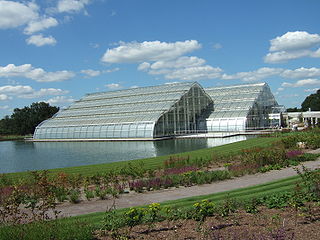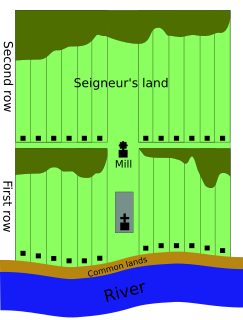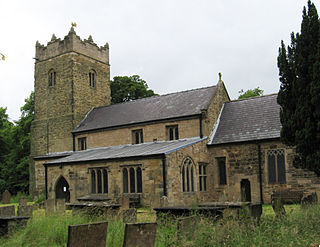
Manorialism, also known as the manor system or manorial system, was the method of land ownership in parts of Europe, notably England, during the Middle Ages. Its defining features included a large, sometimes fortified manor house in which the lord of the manor and his dependents lived and administered a rural estate, and a population of labourers who worked the surrounding land to support themselves and the lord. These labourers fulfilled their obligations with labour time or in-kind produce at first, and later by cash payment as commercial activity increased. Manorialism is sometimes included in the definition of feudalism.

Electromagnetic compatibility (EMC) is the ability of electrical equipment and systems to function acceptably in their electromagnetic environment, by limiting the unintentional generation, propagation and reception of electromagnetic energy which may cause unwanted effects such as electromagnetic interference (EMI) or even physical damage in operational equipment. The goal of EMC is the correct operation of different equipment in a common electromagnetic environment. It is also the name given to the associated branch of electrical engineering.

Copyhold tenure was a form of customary tenure of land common in England from the Middle Ages. The land was held according to the custom of the manor, and the mode of landholding took its name from the fact that the "title deed" received by the tenant was a copy of the relevant entry in the manorial court roll. A tenant – or mesne lord – who held land in this way was legally known as a copyholder.
Lord is an appellation for a person or deity who has authority, control, or power over others, acting as a master, a chief, or a ruler. The appellation can also denote certain persons who hold a title of the peerage in the United Kingdom, or are entitled to courtesy titles. The collective "Lords" can refer to a group or body of peers.

Serfdom was the status of many peasants under feudalism, specifically relating to manorialism, and similar systems. It was a condition of debt bondage and indentured servitude with similarities to and differences from slavery, which developed during the Late Antiquity and Early Middle Ages in Europe and lasted in some countries until the mid-19th century.

Wisley is a village and civil parish in Surrey, England between Cobham and Woking, in the Borough of Guildford. It is the home of the Royal Horticultural Society's Wisley Garden. The River Wey runs through the village and Ockham and Wisley Commons form a large proportion of the parish on a high acid heathland, which is a rare soil type providing for its own types of habitat. It has a standard weather monitoring station, which has recorded some national record high temperatures.

The manorial system of New France, known as the seigneurial system, was the semi-feudal system of land tenure used in the North American French colonial empire.

Falmer is a small village and civil parish in the Lewes District of East Sussex, England, lying between Brighton and Lewes, approximately five miles (8 km) north-east of the former. It is also the site of Brighton & Hove Albion's Falmer Stadium.

Lord of the manor is a title that, in Anglo-Saxon England, referred to the landholder of a rural estate. The lord enjoyed manorial rights as well as seignory, the right to grant or draw benefit from the estate. The title continues in modern England and Wales as a legally recognised form of property that can be held independently of its historical rights. It may belong entirely to one person or be a moiety shared with other people.

A manor house was historically the main residence of the lord of the manor. The house formed the administrative centre of a manor in the European feudal system; within its great hall were held the lord's manorial courts, communal meals with manorial tenants and great banquets. The term is today loosely applied to various country houses, frequently dating from the late medieval era, which formerly housed the landed gentry.

Merlin Charles Sainthill Hanbury-Tracy, 7th Baron Sudeley is a British peer, author, and veteran monarchist. In 1941, at the age of two, he succeeded his first cousin once removed, Richard Hanbury-Tracy, 6th Baron Sudeley, to the Barony of Sudeley and until the House of Lords Act 1999 sat as a hereditary peer.
The court leet was a historical court baron of England and Wales and Ireland that exercised the "view of frankpledge" and its attendant police jurisdiction, which was normally restricted to the hundred courts.
Advowson or patronage is the right in English law of a patron (avowee) to present to the diocesan bishop a nominee for appointment to a vacant ecclesiastical benefice or church living, a process known as presentation.

The manorial courts were the lowest courts of law in England during the feudal period. They had a civil jurisdiction limited both in subject matter and geography. They dealt with matters over which the lord of the manor had jurisdiction, primarily torts, local contracts and land tenure, and their powers only extended to those who lived within the lands of the manor: the demesne and such lands as the lord had enfeoffed to others, and to those who held land therein. Historians have divided manorial courts into those that were primarily seignorial – based on feudal responsibilities – and those based on separate delegation of authority from the monarch. There were three types of manorial court: the court of the honour; the court baron; and the court customary, also known as the halmote court.

Teversal is a small village in the Ashfield district of Nottinghamshire, England, located 3 miles (5 km) west of Mansfield, close to Sutton-in-Ashfield and also the boundary with Derbyshire. Former names include Tevershalt, Teversholt, Tyversholtee, Teversale, Tevershall and Teversall.

A heerlijkheid was a landed estate that served as the lowest administrative and judicial unit in rural areas in the Dutch-speaking Low Countries before 1800. It originated as a unit of lordship under the feudal system during the Middle Ages. The English equivalents are manor, seigniory, and lordship. The German equivalent is Herrschaft. The heerlijkheid system was the Dutch version of manorialism that prevailed in the Low Countries and was the precursor to the modern municipality system in the Netherlands and Flemish Belgium.

Feudalism as practiced in the Kingdom of England during the medieval period was a state of human society that organized political and military leadership and force around a stratified formal structure based on land tenure. As a military defense and socio-economic paradigm designed to direct the wealth of the land to the king while it levied military troops to his causes, feudal society was ordered around relationships derived from the holding of land. Such landholdings are termed fiefdoms, traders, fiefs, or fees.
The Manor of Papworth is located in the parish of Send with Ripley, Surrey, England. It has also been known historically as the Manor of Papeworth, Paperworth, Paperworth Court, and Papeworth Cross, among other names. Its history is intricately connected with that of the manors of Send, Dedswell, and West Clandon.
The Manor of Dedswell is located in the parish of Send with Ripley, Surrey, England. It has also been known historically as the Manor of Dodswell, Dadswell, and Dadswell Court. Its history is intricately connected with that of the manors of Send, Papworth, and West Clandon.

The Lordship of Saxons Lode was a non-metropolitan administrative manorial title in the Kingdom of England, once under the administration of the Danelaw in the 12th century. Saxons Lode Manor House is a ceremonial and historic Germanic pagan manor, situated in the West Midlands region of England.











